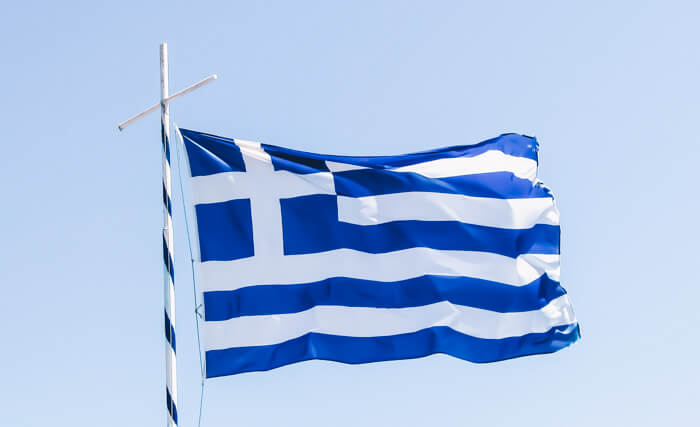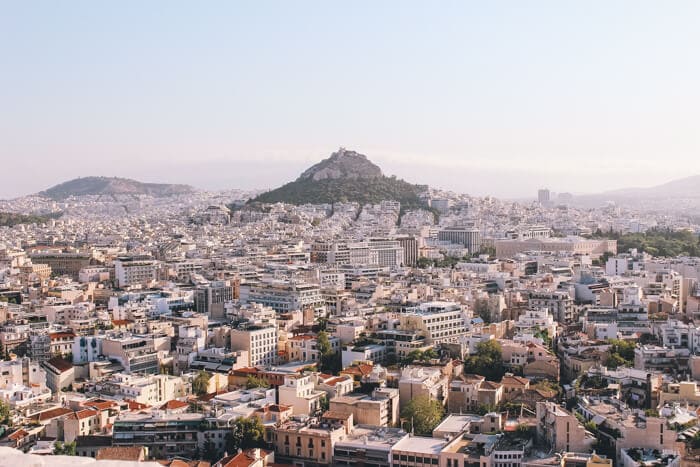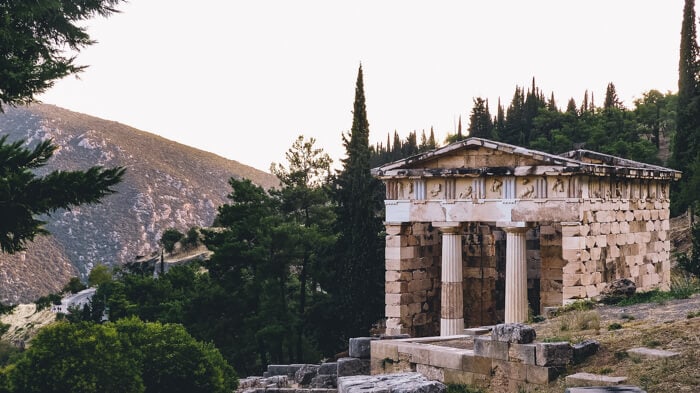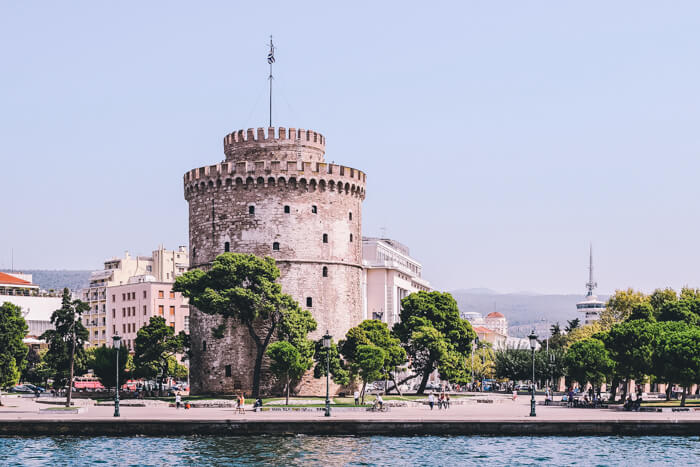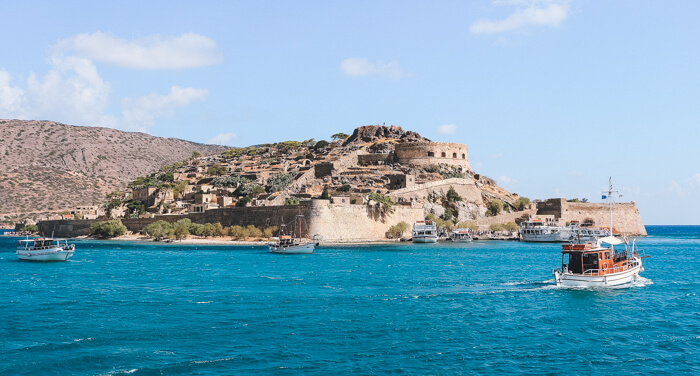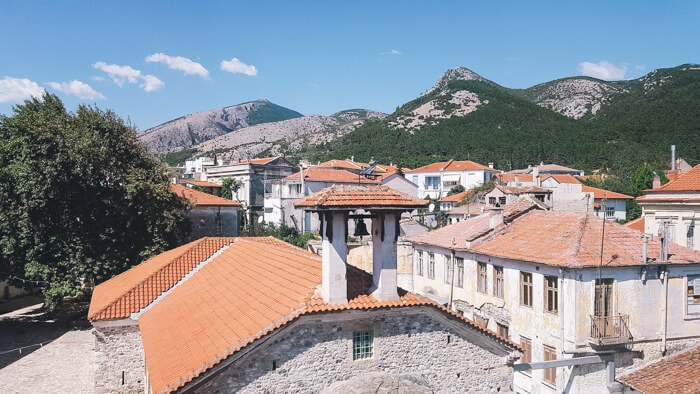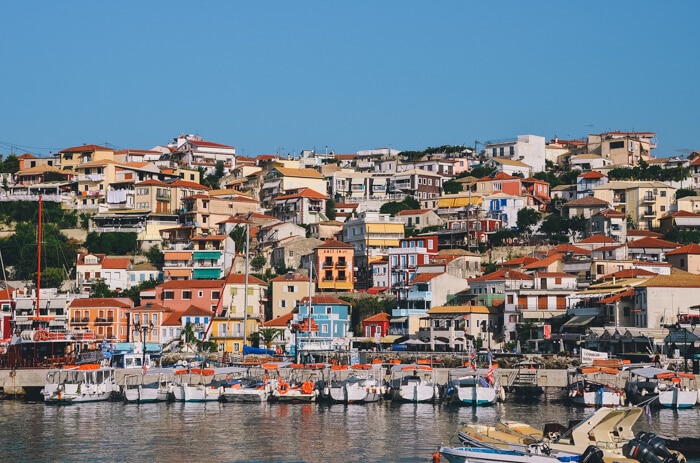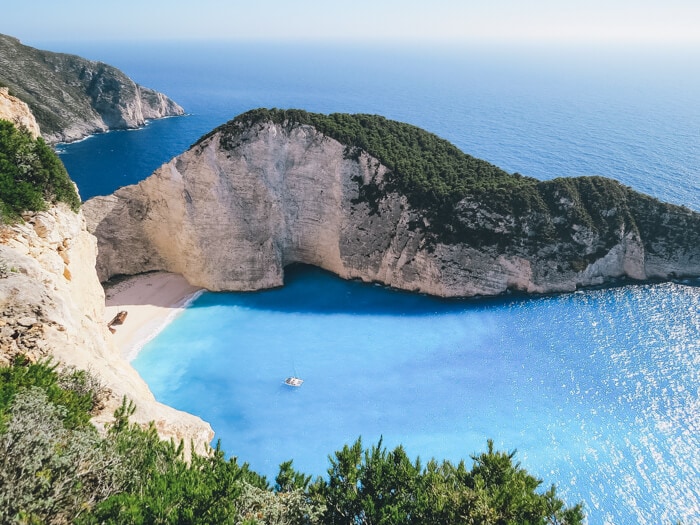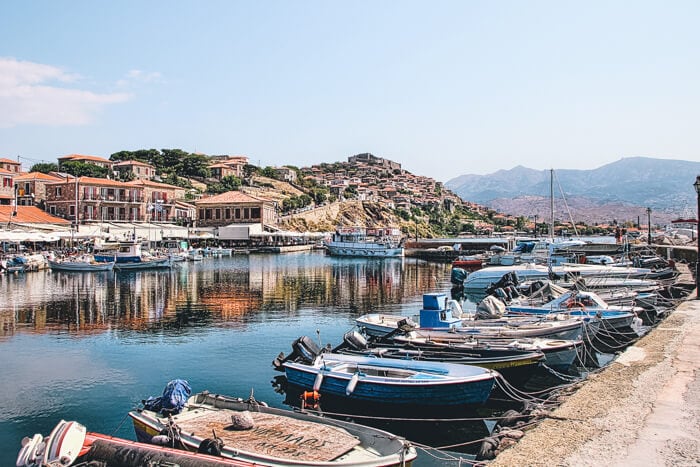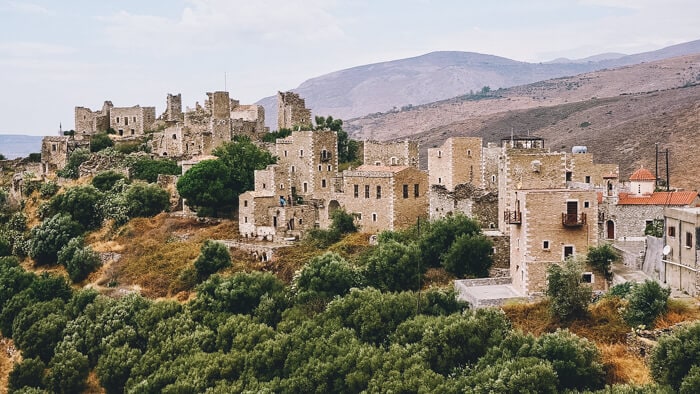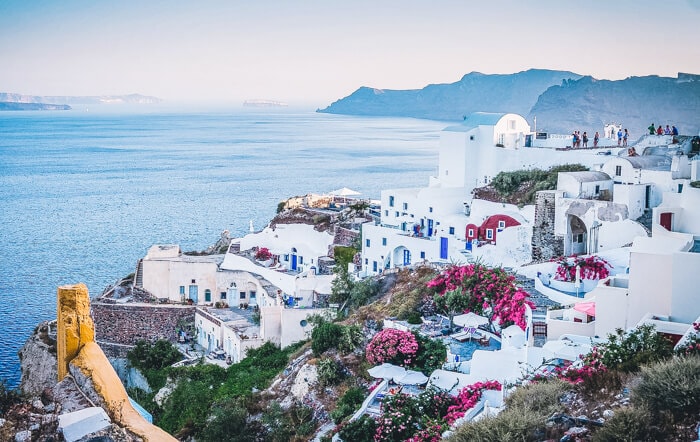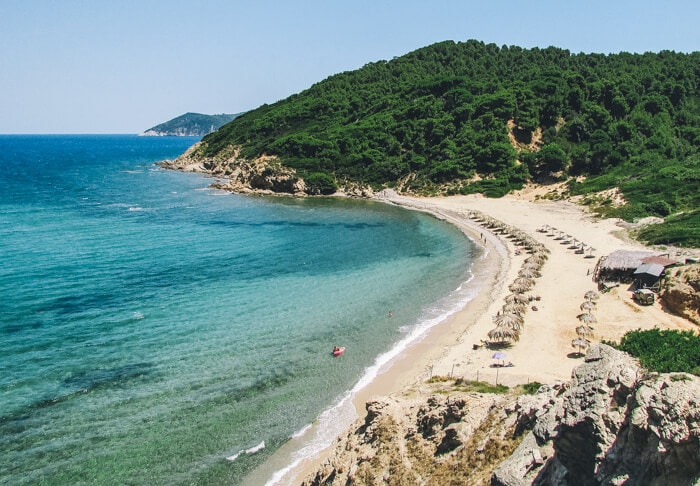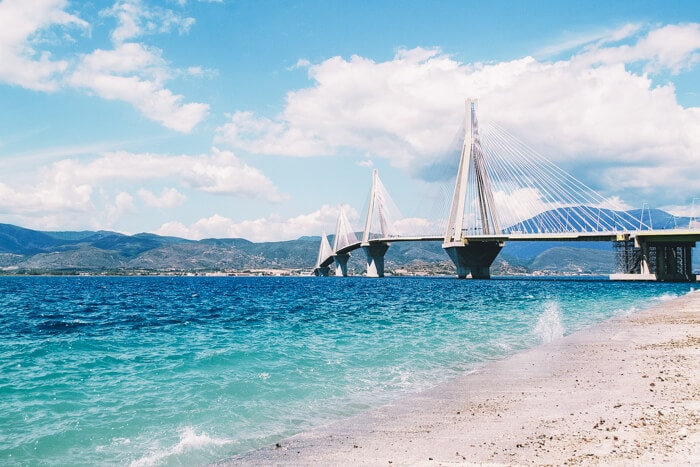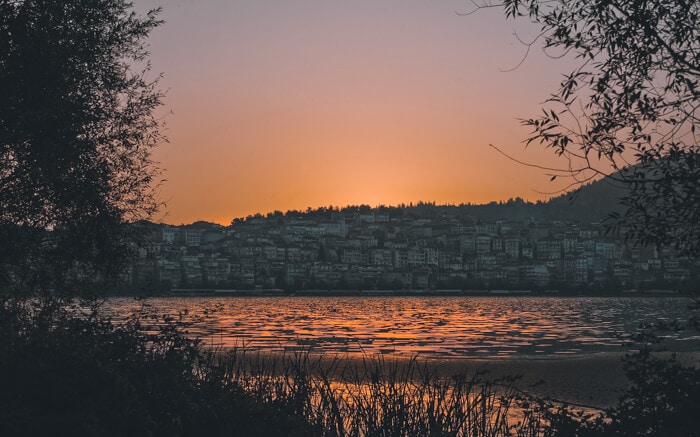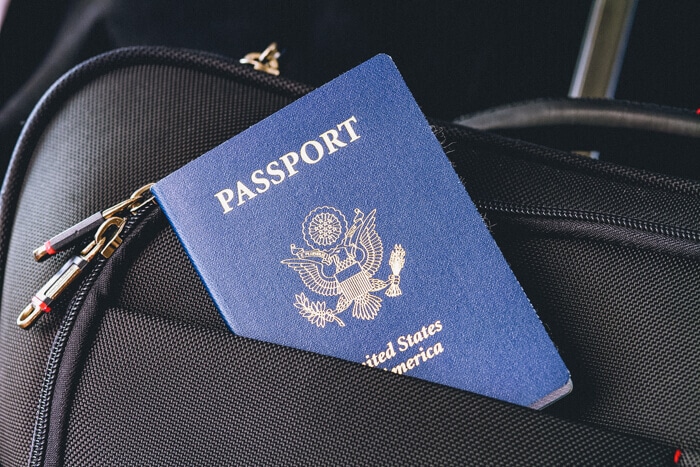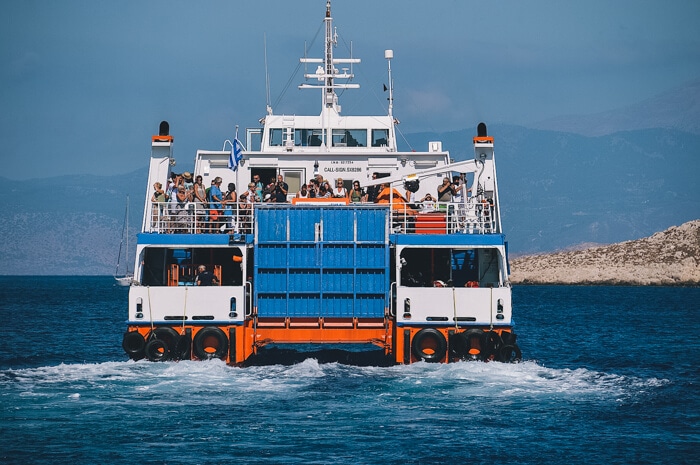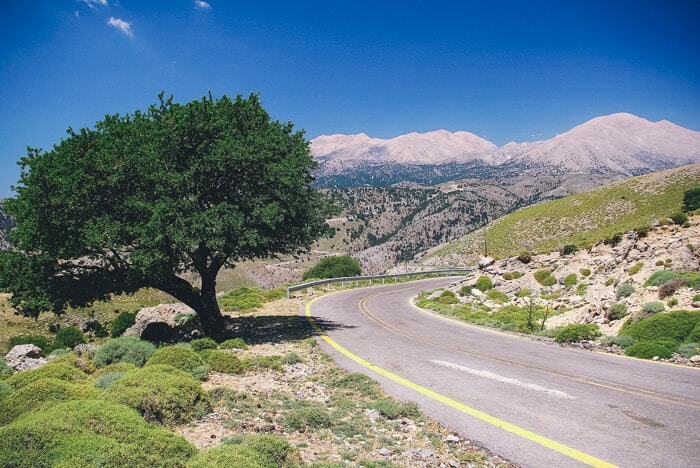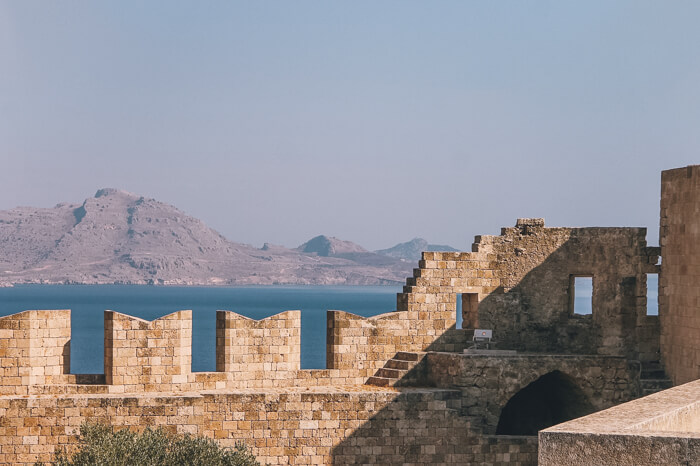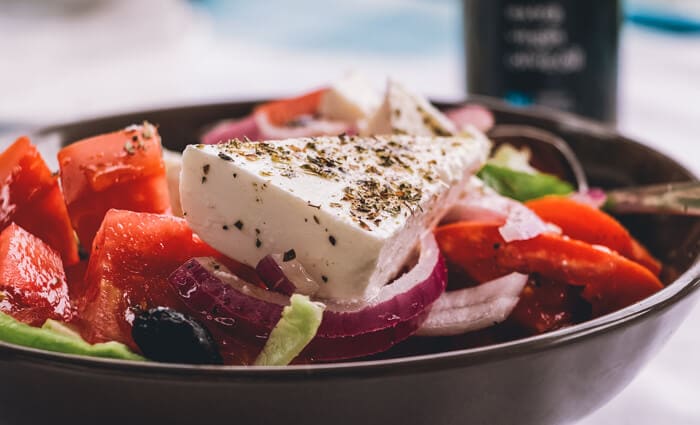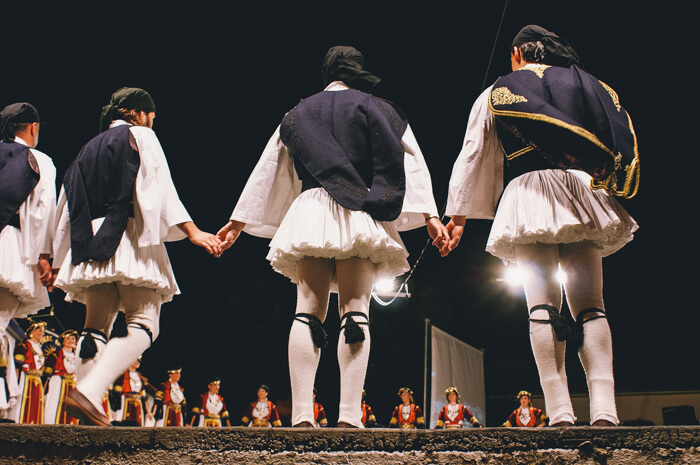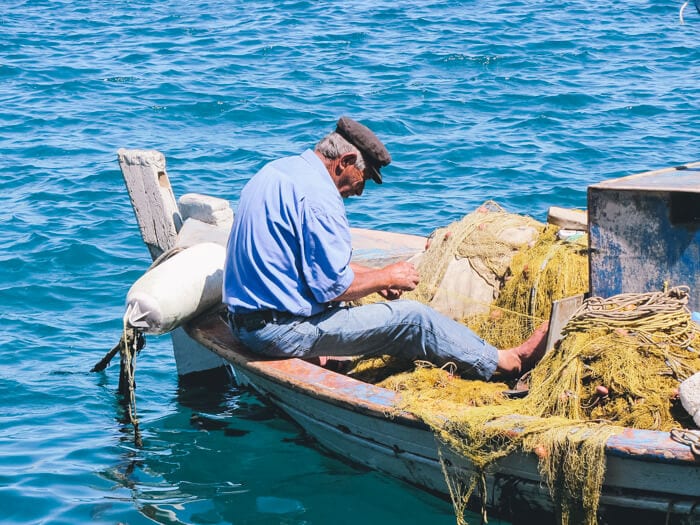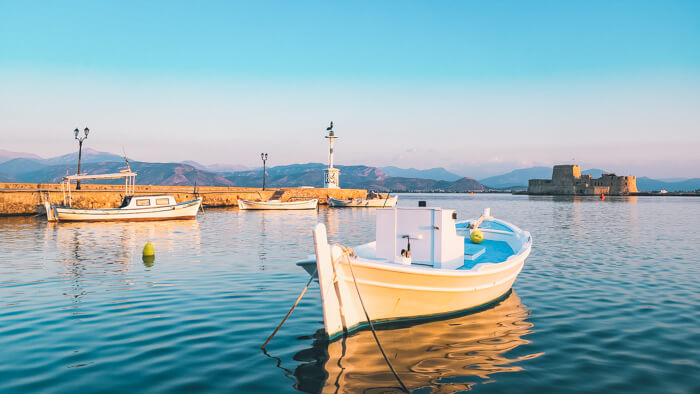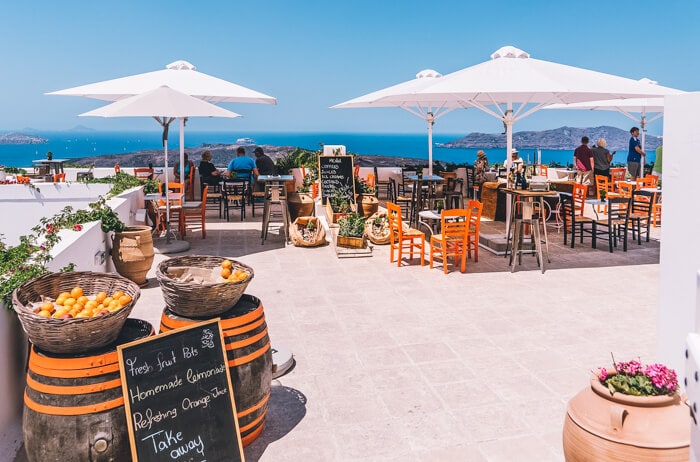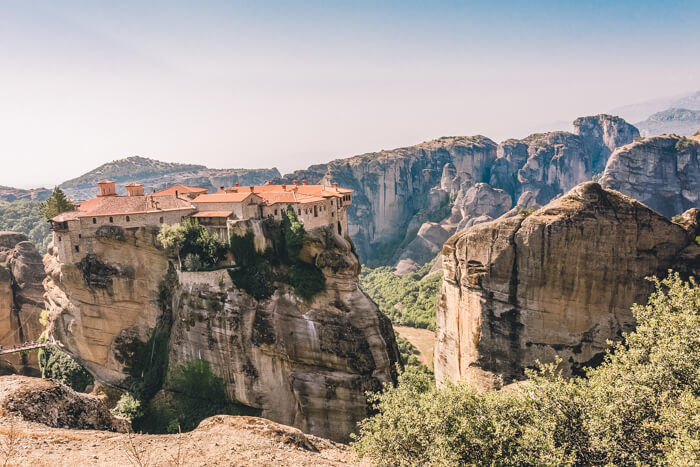Planning a Greece vacation? Good idea! This Greece Travel Guide has tips on the best things to do, popular destinations in Greece, practical things to take into account, and more.
In 2022, Greece welcomed over 26 million visitors, making it one of the most visited countries not only in Europe but the entire world. Its rich history is part of the reason it attracts so many people. Known as the cradle of civilization, you can still see impressive ancient ruins like the Parthenon, the Acropolis of Athens, and many UNESCO world heritage sites?
That’s not all though, the Greek islands are home to pristine beaches, and they’re a great place to top up your tan or go for a paddle in the sea!
Aside from that, Greece is the 15th largest country in Europe and has been a member state of the EU since 1981, and a member of NATO since 1952. It is located in southeast Europe and shares borders with Turkey, Bulgaria, Macedonia, and Albania.
As well as a mountainous mainland, Greece is also made up of over 6,000 islands in the Aegean and Ionian seas. Some, like Crete and Rhodes, have big populations and are extremely popular with tourists. However, there are many more which are uninhabited.
Contents
- Greece Travel Guide: quick facts
- Regions in Greece
- How to travel to Greece
- The best way to travel around Greece
- What to pack for Greece
- The best time to travel to Greece
- What to eat and drink in Greece
- Famous events in Greece
- Public holidays in Greece
- Cultural customs to be aware of in Greece
- Places to stay in Greece
- Don't forget travel insurance
- Basic phrases and their pronunciation
- Safety in Greece
- The use of cash and cards in Greece
- Calling abroad, WiFi and data use in Greece
- Tipping in Greece
- A brief history of Greece
- More tips for your trip to Greece
Greece Travel Guide: quick facts
Size: 131,957 km² or 50,949 sq mi
People living there: More than 10,800,000
Capital: Athens
Governmental structure: Parliamentary representative democratic republic.
National day: March 25
Time zone: Eastern European Time (EET) / UTC+2 / GMT+2
Currency: euro (EUR)
Power voltage and socket type(s): 230V, plug types F and C. If these pug types don't match your devices, make sure to pack a universal adapter.
Official religion(s)/Freedom of religion: Freedom of religion. 90% of the population is Eastern Orthodox, followed by non-religious citizens and Muslims.
Official language(s) and general knowledge of English: Greek is the official language. Basic English is widely spoken.
Drives on this side: right
International driver's licence accepted? yes
Phone code: +30
Vaccinations needed? None are mandatory, but hepatitis A and B, rabies, meningitis, polio, MMR, TDAP, chickenpox, pneumonia, shingles, and influenza are all recommended by the WHO.
Can you drink the tap water? In Athens and Thessaloniki, yes. On the Greek islands, it's best not to but you can always bring a Steripen to clean the tap water.
Want more quick facts? Check out my post full of fun Greek facts.
Regions in Greece
An overview of Greece's different regions can help you plan the best places to vacation in Greece. You can build an itinerary to suit your interests.
1. Attica
The most populous region of Greece, Attica is also known as the province of Athens, and it’s here that you’ll find the capital city Athens. In Athens, you an visit some of the best-preserved examples of ancient Greek architecture, including the Parthenon, the Acropolis, and a number of archaeological museums.
However, this region isn’t only for history buffs – beautiful beaches and the Saronic Gulf are only a stone’s throw away and offer beaches for every type of tourist. As Attica is home to the capital city, you’ll also find some of the country’s top restaurants and hotels here.
2. Central Greece
Bordering Attica and the Peloponnese, Central Greece is found on the mainland. The ancient Greeks considered this as the navel of the world, and here you will find Delphi’s temple of Apollo, one of the most important archaeological sites in the entire country.
The region is also home to one of Greece’s most renowned national parks, Mount Parnassus. The slopes of the mountain are covered in beautiful Kefalonian pine trees, and the park is a great way to get out into nature and boasts a number of hiking trails. There’s also the famous Corycian Cave, where nymphs and the God Pan were once worshipped.
3. Central Macedonia
The second most populous state in Greece – home to just under 2 million people, is home to the country’s second city, Thessaloniki. This isn’t the only notable site here though, there’s the beautiful seaside region of Halkidiki which boasts undisturbed nature and tranquil beaches, and also the world-famous Mount Athos.
As a holiday destination, it’s great for adventurers too. In this region, there’s water-sports and windsurfing on the coast, while heading further inland there’s a range of dramatic scenery – lakes, canyons, rivers, and forests offer fantastic trekking, bird-watching, rafting and even skiing in winter.
4. Crete
Known for its hospitable people, the largest island in Greece is said to have the best beaches in the country and considering there’s a huge coastline and more than 6,000 islands, they must be something really special! The most famous is properly Balos lagoon in Chania, turquoise blue waters accessible by either boat or a hike.
Away from the beaches, it’s hard to beat the Crete’s culture and history – the Minoan palace of Knossos is here – a Bronze age relic which is thought to be Europe’s oldest city, as well as several important monasteries from the 15th century or earlier.
If you’re lucky, Cretans will welcome you into their families and regale you tales of the island’s past – think wars between feuding families and great loves and friendships.
5. Eastern Macedonia and Thrace
The most north-eastern state of Greece, Eastern Macedonia and Thrace shares land borders with both Bulgaria and Turkey. There are Thracian, Byzantine, and ancient Greek archaeological sites here meaning it’s the perfect holiday spot for those who are interested in ancient history and culture.
The state’s history goes back even further than that though, with prehistoric and Neolithic artwork and cemeteries in Ergani and Roussa.
The region also offers a great number of beaches, including one where you can camp at Samothrace, and another with a historical lighthouse, at Alexandropouli. This is the only region where you can cross into Turkey by land.
6. Epirus
Situated on the Greek mainland’s west coast and just below Albania, Epirus offers a different perspective of Greece. You’ll find ancient Dodoni ruins, traditional stone villages, and medieval castles in the region that sits by the Ionian Sea.
Epirus is a great place to shop for traditional Greek gifts too, as there are a number of artisans who still work with traditional crafts.
Although the rich and varied here is famous all across Greece, Epirus is one of the Greek regions less frequented by tourists, so if you’re looking for a slightly quieter and more traditional holiday destination, this could be the perfect place for you.
7. Ionian Islands
The Ionian Islands are primarily made up of Corfu, Kefalonia, Zante (or “Zakynthos”), Ithaca, Paxi, and Lefkada. Due to their location on the west coast of Greece, it is unsurprising that there’s a lot of Italian influence on the islands, from Venetian castles and churches to olive trees and vineyards.
The islands have a rich history – with some of the country’s most impressive medieval architecture on Lefkada, Roman mosaics on Kefalonia, and Byzantine architecture on the Strofades Islands, only 37 miles off the coast of Zante.
The cuisine of the islands is unique compared to others in Greece – don’t miss trying bourdeto (spicy fish stew) or sofrito (slow-cooked veal with garlic and parsley) which are hearty and delicious.
8. North Aegean
Even though the North Aegean islands are far from the country’s centers of population (and closer to mainland Turkey than Greece), they’re really easy to reach traveling by boat or plane. A little off the tourist track, this charming cluster of islands is characterized by picturesque mountain villages and virgin beaches. They remain largely unexplored, offering a more authentic and traditional experience of Greek island life.
There is a range of beaches to be found on the islands, with more than 100 virgin sandy beaches on the island of Limos, and a unique dark volcanic pebble beach on Chios.
There are natural wonders inland too on the islands. Lesvos, for example, boasts a petrified forest. The only other similar one is in Arizona in the USA. And the island of Samothrace is home to numerous waterfalls and hot springs where you can relax after a day of hiking.
9. Peloponnese
Peloponnese is the southernmost state of the Greek mainland and many famous myths originate from here – supposedly Hercules fought the Nemean lion, Paris of Troy ran away with Helen, and the Argonauts sailed from here in their quest to find the Golden Fleece.
Real life is just as fascinating in the Peloponnese, with Frankish, Ottoman, Byzantine, and Mycenaean having all left their mark on the region.
It's a great place for adventures too, as the Taygetos mountains offer some great opportunities for hiking, climbing, and off-roading if you’re brave enough. The main cities in this region are Kalamata, Trifylia, and Argos.
10. South Aegean
The South Aegean Islands consist of the Dodecanese and the Cyclades groups of islands and have some of Greece’s best-known tourist gems, such as Santorini, Rhodes, Mykonos, and Kos. An extensive and reliable ferry network connects many of the islands, meaning that you can fit more than one of these beautiful destinations into the same trip.
It's often possible to book cheap ferry tickets with one of the ferry companies if you book in advance. Make sure to compare ferry companies before booking.
Take in the whitewashed towns of Oia and Fira on the cliffs of Santorini, see the remains of ancient civilizations on Rhodes or party until the early hours on the beaches of Mykonos. Each island has its own distinct character and offers something different for every kind of tourist.
From some of the islands, it’s even possible to do day trips to neighboring Turkey.
11. Thessaly and Sporades
Thessaly and Sporades are made up of a region on the mainland which borders Central Greece, and the Sporades islands in the northwest Aegean Sea. The inhabited islands and popular tourist destinations are Skiathos, Skyros, Alonnisos, and Skopelos.
As well as being known for their beaches, there’s some great coastal diving here. Animal lovers should look no further than Alonnisos, where there’s a marine park that’s home to dolphins and Mediterranean monk seals.
However, the undisputed top attraction of the region is on the mainland. The UNESCO listed Meteora monasteries are gravity-defining; built atop seemingly inaccessible limestone cliffs, doing justice to their name which translates as ‘suspended in space.’
12. Western Greece
Western Greece is made up of the southwestern part of mainland Greece and the northwestern part of the Peloponnese peninsula. For fans of water sports, it’s a great place to holiday.
The Evinos and Acheloos rivers in Aitoloakarnania are perfect for canoeing, kayaking, and white-water rafting. The mountains which surround these rivers are home to beautiful and varied flora, and there are hiking options aplenty.
If you’re looking for a more relaxing holiday, the extensive coastline has a number of both sandy and pebbly bays, with many having been awarded blue flag status. The main cities in Western Greece are Messolonghi and Patras.
13. Western Macedonia
The province of Western Macedonia shares land borders with both Macedonia and Albania and is the only landlocked region – therefore no beaches. However, not to worry as there are a number of scenic forests, lakes, and mountains to make up for it.
The mountainous region also has the lowest population density out of all the country’s 13 regions.
The region’s main cities are Kastoria, Kozani (the capital), and Florina. The dragon’s cave in Kastoria is one of the region’s top attractions – a limestone cave crammed full of stalactites, and was formerly a gold mine.
How to travel to Greece
Entry requirements
Greece is part of the Schengen zone and therefore tourists can enter freely from other countries within this zone. Citizens from outside of the Schengen zone may still enter freely but it’s likely that they will need to show their ID or passport on arrival.
Tourists from North America and the rest of the world can enter for 90 days without a visa, provided you have 3 months validity remaining on your passport from the day you leave.
When you’re entering Greece, especially overland, make sure all of your paperwork and identification is in order, and check with relevant embassies about the status of borders. Greece shares land borders with Albania, Macedonia, Bulgaria, and Turkey.
If you’re entering from Istanbul, Kipi is the most convenient border crossing.
The best way to travel to Greece
Fly to Greece
Traveling by plane is the most common way for international visitors to enter Greece. The country has four main international airports:
- Athens
- Thessaloniki
- Diagoras (Rhodes)
- Crete
There are also a number of smaller international airports, mostly located on the Greek islands and often used for charter flights to Greece from the UK, Germany, and Scandinavia.
The national carrier of Greece is Aegean Airlines and its subsidiary Olympic Air They operate flights to the rest of Europe, the Middle East, and North Africa.
If you’re flying from outside of the regions mentioned above, it’s a good idea to fly into a large European international airport (for example London Heathrow, Frankfurt, or Madrid) and book an onward flight with a budget airline as in that case the airfare to Greece will probably be cheaper.
Check here for flight options and prices.
By bus
Buses are the most common way to travel on the Greek mainland, and it’s possible to travel into the country this way from all of the countries that it shares a border with, and there are multiple border crossings in each country. The easiest country to enter from these four is Bulgaria, as it’s also in the EU and border crossings are generally quick and hassle-free.
Buses between Greece and Albania are operated by Albatrans.
By train
Greece is part of the European rail network and the cheapest way to travel in the country. It’s possible to cross into Greece by train from Bulgaria and Macedonia. OSE (the Railways Organisation) runs daily trains from Thessaloniki to Skopje and Sofia, and onward to Belgrade. There are many connection services to other European countries from Belgrade.
You can also catch a train in Italy and get a connecting ferry which will take you to Patra – a 3 ½ hour drive from Athens. This route can be purchased in the same ticket.
Check here for train routes and prices to Greece.
By ferry
There are several international ferry routes entering and leaving Greece, which travel to Italy, Albania, and Turkey. July and August, Greece’s high season, is when most services operate and also when the seas are calmest.
At this time of year, it’s essential to book in advance, especially if you are taking a vehicle on board with you, as ferries can attract summer crowds. Bear in mind that there’s an extra €10 port tax if you’re traveling to or from Turkey.
Check here for ferry routes and prices to Greece.
The best way to travel around Greece
Getting around Greece independently
Getting around to the best vacation places in Greece is pretty easy, thanks to its extensive bus network. But how do you get around the Greek islands? Don’t worry, if you book a trip to one of the popular islands, the ferry is more often than not included in the bus ticket. Buses are more common and reliable than trains here, and also easier to use.
You can also take ferries between the Greek islands regardless of whether you take the bus first.
If you’re planning on driving in Greece, take note that it’s the country with the highest accident rate in Europe and that not all roads are well maintained. However, there are main roads to all major tourist destinations and a lot of natural sights are hard or impossible to visit without a rental car.
Look here for an overview of rental car options and prices in Greece.
What to pack for Greece
In general, Greece has a typical Mediterranean climate, which is characterized by warm and dry summers, sunshine throughout most of the year, and mild and rainy winters. The mainland, especially in the north and west can be wetter and rainier than other parts of the country.
What to pack for Greece summer travel
- light clothing
- sunglasses
- sunscreen
- a hat
- good walking sandals
- swimwear
- a reusable water bottle
What to pack for Greece in winter
- a light yet warm coat
- a warm scarf
- layers
- a reusable water bottle
- sneakers
What to pack for Greece in fall and spring
- layers
- a rain coat
- sneakers
- a reusable water bottle
- sunscreen
The best time to travel to Greece
The best time to visit Greece depends on where you want to go in Greece, but for the majority of the country, and especially the Greek islands, the best time to visit is in the high season, between May and September, which is also when the majority of the festivals take place.
Some Greek islands, such as Santorini, are great to visit as early as April. This is a good idea if you prefer a milder climate, as temperatures can be as high as 40 degrees Celsius at the peak of summer. When you plan a vacation to Greece, keep in mind that the high season will be busy and popular islands crowded.
Although you can get cheaper deals (especially from European countries) to visit Greece outside of the high season, bear in mind that many restaurants and hotels are seasonal and may not be open when you’re there.
What to eat and drink in Greece
Dolmades – Vine leaves traditionally stuffed with minced meat and long grain rice before being baked in the oven. There are variations all over Greece.
Choriatiki – the quintessential Greek salad is made up of feta cheese, cucumbers, tomatoes, and olives. Dressing is left to the individual choice.
Moussaka – A dish found across the Balkans, the Greek version includes layers of aubergine, mince, béchamel sauce, cheese, herbs, and other vegetables.
Gyros – Strips of meat roasted vertically on a spit placed into a pitta with onions, lettuce, tomatoes, fries, and sauce – usually tzatziki.
Souvlaki – Well cooked meat seasoned with herbs and served with tzatziki sauce.
Keftethes – a crispy and juicy meatball served with a creamy sauce and pitta bread.
Spanikopita – To make this pie, spinach is mixed with feta cheese, olives, and butter before being baked until it’s crispy and golden.
Shrimp Saganaki – Shrimps sautéed in olive oil, deglazed with ouzo, then poured into a spicy tomato sauce before being topped with fresh herbs and feta cheese. Served in a hot ceramic bowl.
Baklava – The most popular dessert features nuts, butter, sugar, pastry, and is drenched in syrup and/or honey.
Ouzo – the country’s national alcoholic drink – pure ethyl alcohol distilled with aniseed to give a licorice flavour. It’s very strong!
Famous events in Greece
- Naoussa Carnival (February/March) – This small town in the Vermio mountains celebrates its rich heritage and customs with masked performers, dance troupes, and elaborate costumes.
- Orthodox Easter (March/April) – Greece does Easter a little differently. There are elaborate processions, brass bands, and each town is spectacularly decorated. Corfu has one of the most vibrant and exciting celebrations but be careful where you stand on Easter Sunday as people throw clay pots from their windows!
- Athens and Epidaurus Festival (June – August) – This amazing festival sees plays, operas, and classical music re-enacted in ancient amphitheaters, while traditional dancing takes place in squares throughout the city.
- Navy Week (June/July) – Celebrated in many of the ports in Greece to commemorate the country’s relationship with the sea, celebrated with seafood, ouzo, and entertainment.
- Kalamata International Dance Festival (July) – This town in the Peloponnese hosts the festival to celebrate contemporary dance and art, attracting dancers and dance groups from around the world.
- Sani Gourmet Festival (Summer) – One for the foodies, this festival takes place in Halkidiki, seeing the finest chefs from across Greece and further afield coming together to make up exciting new dishes.
- Kastoria River Party (August) – A 5-day festival on the Nestorio River, this one sees top Greek musicians performing every year, and sometimes artists from abroad too. As well as the music, you can camp and swim in the river.
- Aegina Fistiki Fest (September) – A four day festival in honour of pistachio nuts, there are music, theatres, and live exhibitions during the nut harvest, while local chefs invent new sweet and savoury dishes with the nut.
- Kalymnos diving and climbing festival (October) – Held on the island of Kalymnos, this event holds climbing competitions as well as seminars, meetups, and excursions. The festival is also partly dedicated to scuba and free diving.
- Thessaloniki International Film Festival (November) – Greece’s second city holds an annual film festival which gives many directors a springboard to a successful career. It has been running for over 50 years and now attracts over 70,000 people annually.
Public holidays in Greece
- New Year’s Day
- January 6 – Epiphany
- March 25 – Independence Day
- Good Friday
- Easter Monday
- May 1 – Labour Day
- Orthodox Whit Monday
- August 15 – Assumption
- October 28 – Ochi Day
- December 25 – Christmas Day
- December 26 – St Stephen’s Day
Cultural customs to be aware of in Greece
There are two things you should be aware of that could cause offence in Greece.
The first is the moutza – a hand gesture and also a traditional Greek insult where every finger is extended before thrusting the palm forward to someone’s face.
Secondly, remember that Greece is a very religious country. Dress modestly when visiting religious sites, and never impersonate a nun or a priest. It could land you in a lot of trouble.
Places to stay in Greece
I always use Booking.com to look for the best hotels and bed and breakfasts. When booking hotels I use the filtering options so I can easily get a list of only those hotels that meet my needs. If you're looking for accommodation in Greece, I highly recommend you check there.
On the occasions that I want to book an apartment rather than a hotel, I use Airbnb.
Don't forget travel insurance
Plan for the best, prepare for the worst. Travel insurance has you covered in case (part of) your trip gets canceled, you get sick or hurt abroad, and sometimes even when your electronics break or get stolen. I always make sure I'm covered every trip I go on.
Don't have travel insurance yet? Check out SafetyWing. They offer super flexible plans that you can even sign up for while you're already on your trip. On top of that, they were the first travel insurance to cover COVID, and when I got COVID, they reimbursed all of my expenses without making a fuss. Their customer support team is great and I can personally recommend them.
Basic phrases and their pronunciation
Learning just a few local phrases can help you get around the country and ensure you have the best vacation in Greece. Greek may initially be a bit daunting as it uses the Greek alphabet, instead of the Roman. To help, phrases are written the pronunciation (or as close as possible to it) in the Roman alphabet. The part in capital letters is where the stress on the word goes.
How are you?
Nice to meet you
Please/You’re welcome
Thank you
Good morning
Good evening
Goodnight
Goodbye
Yes
No
Excuse me/sorry
What is your name?
My name is…
Where is the bathroom?
How much is it?
Do you speak English?
I don’t understand
Cheers!
I love Greece!
Tι κανείς (tee-KAH-nis)?
Χάρηκα πολύ (HA-ree-ka po-LEE)
Παρακαλώ (para-kah-LOE)
Ευχαριστώ (eff-kha-ri-STOE)
Καλημέρα (kah-lee-MER-ah)
Καλησπέρα (kah-lee-SPER-ah)
Καληνύχτα (kah-lee-NEEKH-tah)
Γειά σου (YAH-soo)
Ναί (neh)
όχι (OH-hee)
Συγνώμη (See-GHNO-mee)
πως σε λένε? (pos-oh LEH-neh)
Με λένε (may LEH-neh)…
Πού είναι η τουαλέτα (Poh-EE-nay ee tua-LEH-tah)?
Πόσο κάνει αυτό (POH-soh KAH-nee af-TOH)?
Μιλάτε αγγλικά (Mee-LAH-teh ag-li-KAH)?
Δεν καταλαβαίνω (Then Kah-tah-lah-VEH-noh)
Στην υγειά μας! (STIN-eh YAH-mas)
Αγαπώ την Ελλάδα (Ah-gah-POH teen Eh-LAH-tha)
Safety in Greece
Greece has a tradition of civil protest. If you are in the country and there are riots, avoid university campuses and city centers. These can be scary, but are not very common, and violence is rarely directed at humans – least of all tourists.
Although Greece doesn’t have any other obvious safety problems, petty crime is more prevalent in tourist areas. The top crime against tourists is pick-pocketing, so make sure you keep your valuables safe and you know where they are at all times.
The use of cash and cards in Greece
ATMs are common throughout the country, and every town or village should have one. Although debit cards and credit cards are accepted in the majority places in Greece, it’s a good idea to have some euros on you, especially if you’re heading off the beaten track, or if you want to buy from local markets or independent shops, restaurants, or cafés.
When withdrawing cash, try and use a national or international bank rather than an ATM in an airport, hotel, or tourist area. These often have high withdrawal fees. If your home currency is not the euro, avoid DCC (dynamic cash conversion).
Calling abroad, WiFi and data use in Greece
Those with a SIM card from an EU country don't have to pay roaming charges when calling, texting, or using data in Greece. The same goes for some global phone plans.
If you don't have a EU SIM but still want to have unlimited WiFi, check out Solis Wifi.
Skyroam offers both day passes and monthly subscriptions providing you with 4G throughout your trips. I've been using their daily passes not just when I travel outside the EU (no roaming charges for me in the EU) but also as a backup for when I think I'll go over my phone's data plan.
Tipping in Greece
In Greece, tipping isn't obligatory but it is appreciated. You can find some guidelines on what to tip in Greece here.
A brief history of Greece
Greece is often called the birthplace of western civilization, and it dominated most of the Mediterranean thousands of years ago. Under the rule of Alexander the Great, its empire expanded across a large part of Europe and Western Asia. Ancient Greek culture heavily influenced Roman culture, the next great European empire.
The first great civilization was found in Crete in 2000 BC – the Minoans. They were conquered around 500 years later by the Mycaeneans. Ancient Greece was divided into city states, with the most popular being Athens.
Athens’ Archaic period lasted from around 800 – 508 BC and saw Homer write the Iliad, as well as the birth of the Olympic Games. Then came the Classical period, which is when Athens was governed by Democracy and philosophers such as Socrates and Plato were prominent figures in society. The classical period ended with death of Alexander the Great in 323 BC. The Hellenistic period followed, ending in 146 BC when the Romans conquered Greece.
The Byzantine empire took over from the Romans in 324 AD and was in power for over 900 years, where the country prospered economically and artistically. Between the 15th and the 18th century, Greece passed between Venetian and Ottoman rule, and you can see the impact left by their cultures across the country.
Although Greece declared its independence in 1821, it was not recognized until 11 years later. In the early 20th century, the Balkan Wars saw Greece double its size and territory, making it recognzsable as the country we know today.
After a civil war just after World War II, and a military dictatorship from 1967 – 74, Greece was restored to a democracy. It joined the EU in 1980 and adopted the euro as its currency in 2001.
In recent years, Greece was one of the worst affected countries in the financial crisis, and austerity measures taken by the government saw periods of civil unrest. However, it has retained its popularity with tourists and is one of the most visited countries in the world nowadays.
More tips for your trip to Greece
Planning to visit Greece? Check out my Greece travel blog posts full of tips.
PIN FOR LATER

